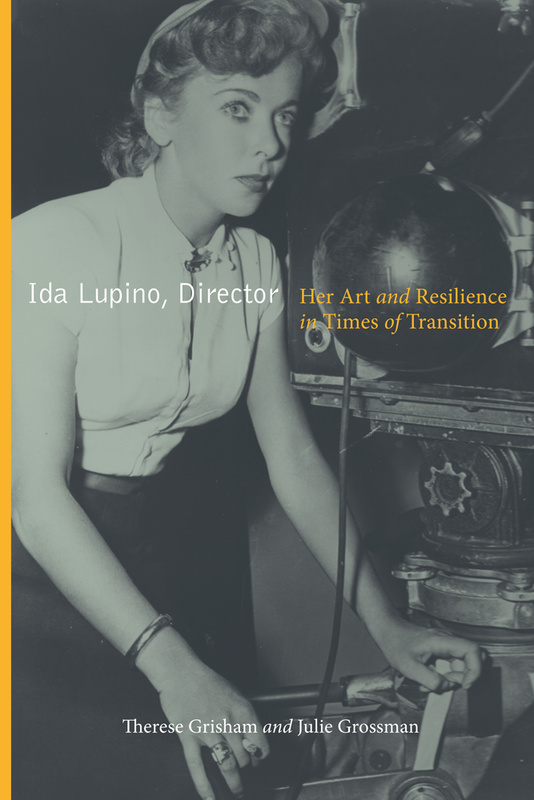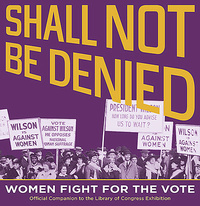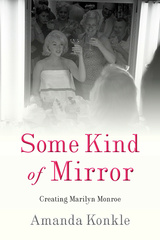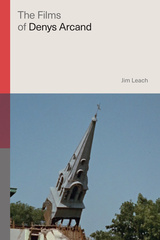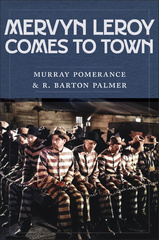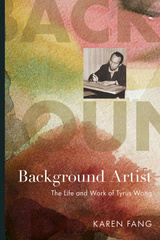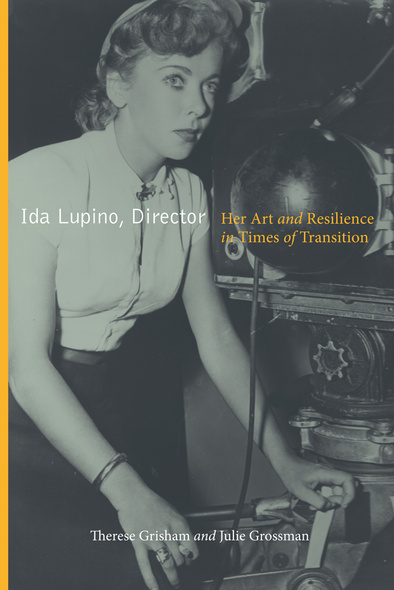
264 pages, 6 x 9
64 photographs
Paperback
Release Date:23 May 2017
ISBN:9780813574905
Hardcover
Release Date:23 May 2017
ISBN:9780813574912
Ida Lupino, Director
Her Art and Resilience in Times of Transition
By Therese Grisham and Julie Grossman
Rutgers University Press
Dominated by men and bound by the restrictive Hays Code, postwar Hollywood offered little support for a female director who sought to make unique films on controversial subjects. But Ida Lupino bucked the system, writing and directing a string of movies that exposed the dark underside of American society, on topics such as rape, polio, unwed motherhood, bigamy, exploitative sports, and serial murder.
The first in-depth study devoted to Lupino’s directorial work, this book makes a strong case for her as a trailblazing feminist auteur, a filmmaker with a clear signature style and an abiding interest in depicting the plights of postwar American women. Ida Lupino, Director not only examines her work as a cinematic auteur, but also offers a serious consideration of her diverse and long-ranging career, getting her start in Hollywood as an actress in her teens and twenties, directing her first films in her early thirties, and later working as an acclaimed director of television westerns, sitcoms, and suspense dramas. It also demonstrates how Lupino fused generic elements of film noir and the social problem film to create a distinctive directorial style that was both highly expressionistic and grittily realistic. Ida Lupino, Director thus shines a long-awaited spotlight on one of our greatest filmmakers.
The first in-depth study devoted to Lupino’s directorial work, this book makes a strong case for her as a trailblazing feminist auteur, a filmmaker with a clear signature style and an abiding interest in depicting the plights of postwar American women. Ida Lupino, Director not only examines her work as a cinematic auteur, but also offers a serious consideration of her diverse and long-ranging career, getting her start in Hollywood as an actress in her teens and twenties, directing her first films in her early thirties, and later working as an acclaimed director of television westerns, sitcoms, and suspense dramas. It also demonstrates how Lupino fused generic elements of film noir and the social problem film to create a distinctive directorial style that was both highly expressionistic and grittily realistic. Ida Lupino, Director thus shines a long-awaited spotlight on one of our greatest filmmakers.
[A] landmark study of this underrecognized director. The book couldn't be timelier… Grisham and Grossman do not consider their subject narrowly as a woman filmmaker. They present Lupino broadly as a pioneer independent moviemaker and director.
Exactly the serious study Ida Lupino deserves, this superb book sketches her directing career against larger developments in postwar Hollywood, demonstrating her feminist impact on a changing industry.
Low budget, unheralded and genre bending, Lupino’s work has never received its full due. Grisham and Grossman’s sensitive study, informed by thorough research and new paradigms, provides a welcome corrective.
One of Hollywood’s few female directors, Ida Lupino was a true maverick, making movies with the same steely determination and emotional sensitivity that characterized her work as an actor. Therese Grisham and Julie Grossman’s thoughtful study sheds a welcome light on an oeuvre that has been too long obscured.
Grossman and Grisham's book is an urgently needed and long overdue reclamation of the directorial work of Ida Lupino, one of the most significant auteurs of the twentieth century. Cineastes will be delighted by this dazzling, well written, and comprehensive book.
[A] groundbreaking and judiciously comprehensive study.
THERESE GRISHAM is a lecturer in film and media studies in the department of humanities at Oakton Community College in Des Plaines, Illinois, as well as an instructor at the Facets Multimedia Film School in Chicago. She is also an editor for the English translations of The Complete Works of Rosa Luxemburg (Verso).
JULIE GROSSMAN is a professor of English, and communication and film studies at Le Moyne College in Syracuse, New York. Her books include Rethinking the Femme Fatale in Film Noir, and Literature, Film, and Their Hideous Progeny. She is also a coeditor of the forthcoming collection Adaptation in Visual Culture: Images, Texts, and Their Multiple Worlds.
JULIE GROSSMAN is a professor of English, and communication and film studies at Le Moyne College in Syracuse, New York. Her books include Rethinking the Femme Fatale in Film Noir, and Literature, Film, and Their Hideous Progeny. She is also a coeditor of the forthcoming collection Adaptation in Visual Culture: Images, Texts, and Their Multiple Worlds.
Preface
Acknowledgments
Note on Quotations
Part I. Introducing Ida Lupino, Director and Feminist Author
A Rejection of Hollywood
Lupino Directs
Director Lupino and Colleagues
The Filmakers’ Films
Lupino and the Censors
Lupino as Feminist Auteur
Postwar Hollywood, American Society and Culture
Close-up on Outrage
Empathy and a Cinema of Engagement
Italian Neorealism or American Realisms?
Looking Backward? Outrage and M
Part II. Lupino’s Ingenious Genres: Early Films and The Trouble with Angels (1966)
The Social Problem Film and Film Noir
Home Noir
Home Is Where the Noir Is
Doubled Dreams in Hard, Fast and Beautiful
Doubled Domesticity in The Bigamist
Doubled Trauma: Outrage
A Mighty Girl: Lupino and The Trouble with Angels
Part III: Lupino Moves to Television
Industrial Contexts: Film to Television
Directing for Television
“No. 5 Checked Out”
Ida Lupino, Television Director
On Close Readings of 1950s and 1960s Television
“The Return”: Norma Desmond and Ida Lupino Haunt the Small Screen
Mr. Adams and Eve
Directed Episodes, 1956–1968
Comedies
Action, Thrillers, Mysteries
Westerns
Notes
Works Cited
Index
Acknowledgments
Note on Quotations
Part I. Introducing Ida Lupino, Director and Feminist Author
A Rejection of Hollywood
Lupino Directs
Director Lupino and Colleagues
The Filmakers’ Films
Lupino and the Censors
Lupino as Feminist Auteur
Postwar Hollywood, American Society and Culture
Close-up on Outrage
Empathy and a Cinema of Engagement
Italian Neorealism or American Realisms?
Looking Backward? Outrage and M
Part II. Lupino’s Ingenious Genres: Early Films and The Trouble with Angels (1966)
The Social Problem Film and Film Noir
Home Noir
Home Is Where the Noir Is
Doubled Dreams in Hard, Fast and Beautiful
Doubled Domesticity in The Bigamist
Doubled Trauma: Outrage
A Mighty Girl: Lupino and The Trouble with Angels
Part III: Lupino Moves to Television
Industrial Contexts: Film to Television
Directing for Television
“No. 5 Checked Out”
Ida Lupino, Television Director
On Close Readings of 1950s and 1960s Television
“The Return”: Norma Desmond and Ida Lupino Haunt the Small Screen
Mr. Adams and Eve
Directed Episodes, 1956–1968
Comedies
Action, Thrillers, Mysteries
Westerns
Notes
Works Cited
Index

